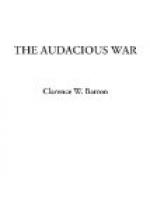CHAPTER XVI
THE LESSONS FOR AMERICA
Wealth is National Defense—Gold Mobilization—Food Supplies International—No Financial Independence—Tariffs as War Causes—Are We in a Fool’s Paradise?
The lessons for the United States and for all America from this war are so many that it is difficult to arrange them in order.
The first lesson is that nations can be no longer isolated units. A hundred years ago the United States desired to be free from Europe,—from its political system, its wage system, and its social system. To-day the United States cannot desire to be freed from any country in the world. Its Panama Canal, its demand for a mercantile marine, for countries to take its cotton and cotton goods, and its inquiry as to where it can get potash salts and chemical dyes, all show the interrelation of modern business which has broken all national boundaries.
England is talking to-day of a closer federation in her empire to follow this war. She is asking why she alone should be the protector of the seas, and of the peace of Europe, not only for herself and her colonies, but for the whole world. She is already talking of a federation for the empire by which Australia, Canada, etc., will have direct representation in Parliament, and assist directly in bearing the burden of the maintenance of peace. I doubt if a British federation will strengthen the British Empire. Mutual interest is the great federator. The unwritten Constitution of England has more binding force than the written Constitution of the United States. The Triple Entente is stronger and more binding than the Triple Alliance.
The whole world is interested in the maintenance of peace, and it should not be the business of any one nation or empire to maintain the peace of the world.
Secondly, if the burden is put upon England to maintain the peace of the seas and the peace of Europe, she must have a growing empire to support that burden.
Already the English people see the spread of her influence which is to follow this war and make Cecil Rhodes’s dream of a Cape to Cairo railroad a reality for Africa. Egypt, Palestine, and Asia Minor are hereafter to be restored in fertility and give a new civilization to the shores of the eastern Mediterranean.
Is it to be assumed that with the new development for Africa and Asia, Europe is going to abandon her interest on the continents of America?
Will not the very force of these developments make a foundation for European developments in North and South America?
Have we not seen that the British Empire has still some interest in the Panama canal? Is it to be supposed that when peace succeeds in Europe, and the European nations lie down together for another period of mutual development, France will make no inquiry concerning her $800,000,000 of property in Mexico? Or that England will adopt Mr. Bryan’s idea that any Englishman or American who goes into Mexico cannot look for any protection from his home government?




